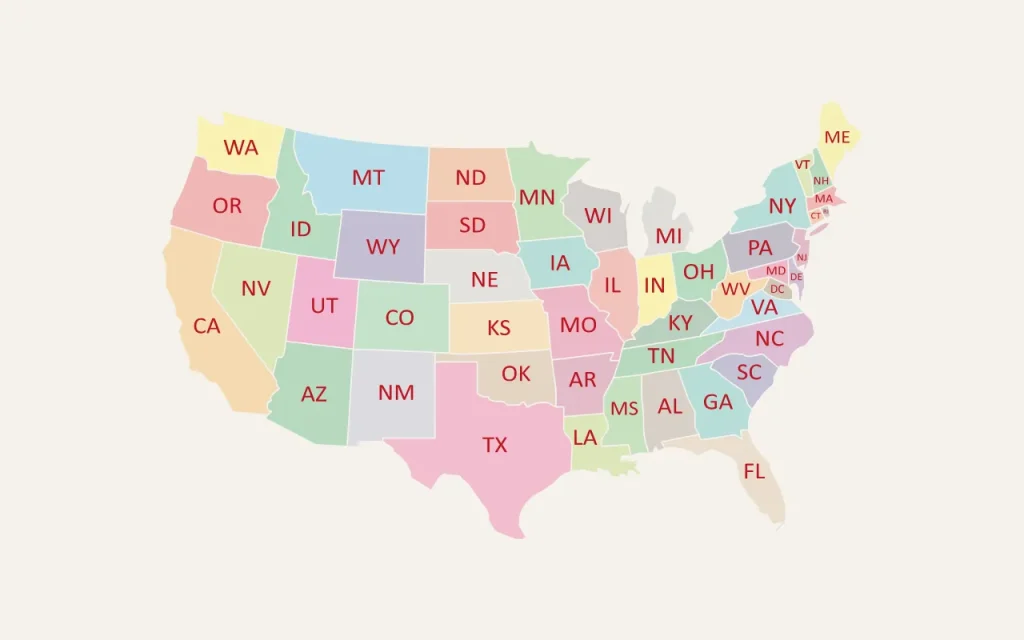An out-of-state student is someone who attends a college or university outside of their home state. This classification significantly impacts tuition costs due to the distinct differences between in-state and out-of-state tuition rates. In many public institutions, out-of-state students often pay two to three times more than their in-state counterparts.
The financial landscape for these students carries unique challenges:
- Higher Tuition Fees: Elevated tuition fees are a primary financial burden for out-of-state students. These increased costs can be overwhelming and require careful financial planning.
- Limited Access to Financial Aid: Often, certain types of state-sponsored financial aid are reserved for residents. As an out-of-state student, access to these funds might be restricted, adding another layer of financial burden.
Out-of-state student scholarships are for students who choose to attend college out of their home state. This can be difficult, especially when considering leaving behind friends and family. In addition to researching scholarships, check out the Federal Student Aid program to fill out a free FAFSA application and see if you are eligible for the Federal Pell Grant.
We’ve handpicked scholarships for out-of-state students, including their deadlines and award amounts. Regardless of your education level and field of study, we’re here to show you our favorites based on extensive research and insider expertise. We’ll also explain the different scholarship types and how you can maximize your chances of winning, ensuring you feel prepared for the new educational journey that lies ahead.
Scholarships awarded to out-of-state students help reduce tuition costs and make studying in a new state more accessible. View our recommendations today!

Different Types of Out-of-State Scholarships
College students attending school in a new state can apply for several types of scholarships. We’ve broken down the most common kinds below.
Merit-Based Scholarships
A merit-based scholarship awards out-of-state students who excel in a specific academic area, such as their grades, standardized test scores, or extracurricular involvement. Merit-based scholarships typically ask for proof of merit, such as a transcript that meets the program’s minimum GPA requirements.
Need-Based Scholarships
These scholarships target students who demonstrate financial need and couldn’t otherwise pursue their educational goals without financial support. Students seeking need-based scholarships can apply for federal assistance or may qualify for other programs, including privately funded or through their school.
Career or Major-Specific Scholarships
These scholarships are for students at out-of-state colleges pursuing a specific major or career path. For example, students who want to become pilots can apply for aviation scholarships. Likewise, students can find scholarship programs for nursing, teaching, social work, and other career paths.
Student-Specific Scholarships
Student-specific scholarships consider applicants based on factors like race, religion, gender, medical history, and similar criteria. These opportunities aim to increase inclusion and make education more accessible for certain students.
International-Based Scholarships
International scholarships are for students without US residency who want to attend a domestic college or university. Some may only consider students from a specific country or encourage any international student to apply.
College-Specific Scholarships
US colleges and universities often provide scholarships for incoming first-year college students who meet specific requirements. They may consider your previous academic work, test scores, or athletic accomplishments. Still, each school will vary, so it’s best to check with your financial aid department to learn about the available college scholarships.
Finding Scholarships for Out-of-State Students
1. Researching Online Scholarship Databases
Searching for scholarships as an out-of-state student can be overwhelming, but online scholarship databases make it easier.
Why Use Online Scholarship Databases?
- Comprehensive Listings: Many online databases gather scholarship opportunities from various sources, creating a central hub that saves you time and effort. Some, like Bold.org, offer exclusive scholarships that are available only on their platform, making the opportunities more unique and tailored to your needs.
- Tailored Searches: Many databases allow you to filter searches by criteria such as location, field of study, or eligibility requirements.
- Updated Information: Reliable databases regularly update their listings to reflect current scholarship offerings and deadlines, ensuring you have access to the latest opportunities.
2. Exploring Institutional Resources and Local Community Scholarships
When looking for scholarships for out-of-state students, it’s important to consider more than just national opportunities. Institutional resources at the colleges you’re interested in often have a wide range of funding options specifically designed for out-of-state candidates.
Tap into Financial Aid Offices
Schedule a meeting with the financial aid office at your chosen institution. They usually have comprehensive information about scholarships that cater to out-of-state students, as well as options that might not be widely advertised.
Connect with Scholarship Committees
Many colleges have dedicated scholarship committees responsible for managing school-specific awards. These committees can provide insights into application processes and criteria unique to their programs.
Exploring local community scholarships can also be very beneficial. Scholarships from local organizations typically have fewer applicants, which may increase your chances of receiving funding.
Reach Out to Community Organizations
Check with local clubs, non-profits, and civic groups in your hometown or region.
Investigate Local Businesses and Foundations
Many businesses and foundations provide scholarships as part of their commitment to community development. Contact them directly or visit their websites to find out about available opportunities.

How to Apply for Out-of-State Scholarsh1. Start Early
Many scholarships have early deadlines, and starting early gives you ample time to find the best opportunities.
2. Tailor Your Applications
Personalize each scholarship application. Generic applications are easy to spot and often less compelling.
3. Highlight Unique Aspects
Leverage the unique perspectives and experiences that come with being an out-of-state student.
4. Seek Guidance
Utilize school resources such as career counselors or financial aid advisors.
5. Proofread Diligently
Ensure your application is free from grammatical errors and typos.
6. Follow Instructions Carefully
Adhere strictly to application guidelines. Missing a requirement or failing to follow instructions can result in disqualification.
7. Stay Organized
Keep track of deadlines, required materials, and submission formats for each application.

Tips for Winning an Out-of-State Scholarship
If you want to increase your chances of winning an out-of-state scholarship, follow these top tips during the application process.
Tip 1: Start Your Scholarship Search Early
Perhaps the most overlooked part of the scholarship application process is the advantage of applying early. By giving yourself more time, you can find additional scholarship programs and give yourself more room to create the best possible applications.
Tip 2: Apply for Several Scholarships
You can apply for as many scholarships as you want. In fact, the more you apply for, the better your chances of securing one. Take advantage of all the available opportunities and submit applications for as many as possible.
Tip 3: Maintain Your Academic Performance
Whether you’re nearing the end of high school or in the middle of college, maintaining your academic performance demonstrates your commitment to success. Do your best to maintain a high GPA and attendance record, ensuring you show the panels you will continue your commitment.
Tip 4: Tailor Your Applications
Every scholarship has a different application and requirements, so you want to give each one the attention it deserves. Follow the instructions and go above and beyond, tailoring each one to the criteria and showing why you deserve to win.
Tip 5: Write a Powerful Essay
If you apply for a scholarship that requires an essay or personal statement, use it as an opportunity to speak directly with the scholarship panel. Review the prompt and writing guidelines while using your personal voice to demonstrate why you deserve to win.
Frequently Asked Questions About Out-of-State Scholarships
1. What Are the Key Differences Between In-State and Out-of-State Tuition?
Out-of-state tuition is often significantly higher than in-state rates because state-funded schools give priority to residents who contribute to local taxes. Research tuition reciprocity agreements or scholarships for out-of-state students to help reduce costs.
2. How Can I Find Affordable Housing as an Out-of-State Student?
Start by checking your school’s housing office for on-campus options, which are often the most convenient. If you prefer off-campus housing, explore local rental listings or student housing communities near the college. Joining student forums or social media groups can also connect you with potential roommates.
3. What Steps Should I Take to Establish Residency in My New State?
Residency requirements vary by state but typically involve living there for at least a year, registering to vote, getting a state driver’s license, and demonstrating financial independence. Check with your school’s admissions or financial aid office for guidance.
4. What Resources Are Available to Help Me Adjust to Life Out of State?
Most colleges offer orientation programs, student organizations, and counseling services to help out-of-state students adapt. Seek out cultural clubs or regional groups that connect students from similar backgrounds or geographical areas.
5. What Is the Southern Regional Education Board and How Can It Help Out-of-State Students?
The Southern Regional Education Board (SREB) is a coalition of states in the southern U.S. Through the Academic Common Market, students can qualify for in-state tuition rates at participating schools if their program of study isn’t offered in their home state. Visit the SREB website for more information and eligibility requirements.
6. How Does the Western Undergraduate Exchange Benefit Out-of-State Students?
The Western Undergraduate Exchange (WUE) is a program that allows students from participating Western U.S. states to pay reduced tuition rates at out-of-state colleges and universities. This can save students thousands of dollars annually compared to standard out-of-state tuition. To participate, check if your desired school and program are part of the WUE network and apply for the benefit during the admissions process.
7. What Is the Ball State Scholars Award, and Who Is Eligible to Apply?
The Ball State Scholars Award is a merit-based scholarship designed to support non-resident students pursuing a college education at Ball State University. Scholarships are awarded to eligible students based on academic achievements, such as GPA and standardized test scores, and may also consider extracurricular activities.
8. Does Florida State University Offer Merit Scholarships for Non-Resident Students?
Yes, Florida State University provides a variety of merit scholarships for non-resident students. These scholarships are awarded to those who exhibit strong academic performance, leadership qualities, and involvement in extracurricular activities.
Pursuing a college degree? Check out our blog today to learn more about college, student finances, and tutoring services.

Paulla Jenne
Paulla showcases her expertise in writing and communication through her influential articles for Scholarship Institute. She focuses on creating review articles and recommendations that guide students in exploring educational funding.





